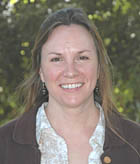Awards and Honors
Santa Cruz Cancer Benefit Group funds cancer
research fellowship
By Tim Stephens
The Santa Cruz Cancer Benefit Group (SCCBG) has established
a new fellowship to support cancer research at UCSC. The SCCBG
Research Fellowship is an annual award of $10,000 to support
a UCSC graduate student or postdoctoral researcher engaged in
cancer-related research.

Jennifer Compton
Photo: Tim Stephens
|
The group awarded the first SCCBG Research Fellowship to Jennifer
Compton, a postdoctoral researcher studying genetic factors
involved in breast cancer. The fellowship will support Compton's
work with Gary Silberstein, a research scientist in the Department
of Molecular, Cell, and Developmental Biology.
The SCCBG, which celebrated its 10th anniversary last spring,
raises funds for distribution to local cancer support groups
and cancer research organizations. The new award represents
the group's first gift to UCSC, where scientists are engaged
in a broad range of cancer-related research projects. These
include studies of the molecular mechanisms and genetic factors
involved in cancer, as well as efforts to identify and synthesize
new cancer-fighting compounds.
"A lot of people in our group were not even aware that
UCSC is involved in cancer research. We are very excited about
supporting this important research in our local area,"
said SCCBG director Jeni Brill.
Cancer research at UCSC is primarily sponsored by the National
Institutes of Health and other major organizations such as the
American Cancer Society. Silberstein, for example, has grants
from the National Cancer Institute to support his research on
genes involved in breast cancer.
The project that Compton will work on with funding from the
SCCBG fellowship represents an important new direction for his
research, Silberstein said. "This award enables us to launch
a new area of research in our lab, so it's very important for
us," he said.
Compton will be studying the "breast cancer predisposition
gene" known as BRCA1. Mutations in this gene greatly increase
the risk of breast cancer. Compton's research is aimed at understanding
the normal role of BRCA1 in mammary tissue and the role of hormones
in regulating the gene's activity.
"It is important to study the normal development of mammary
tissue so that we can better understand what goes wrong in breast
cancer," Silberstein said. "This is the kind of basic
research that can lay the foundation for advances in cancer
therapy."
Compton attended UCSC as both an undergraduate and a graduate
student, earning B.A. and Ph.D. degrees in molecular, cell,
and developmental biology. Since completing her Ph.D. in 2003,
she has done postdoctoral research with chemistry professor
Phillip Crews. Crews's laboratory is exploring the pharmacological
potential of compounds derived from marine sponges and other
marine organisms. Some of the novel compounds they have isolated
have shown promise as potential cancer therapies. Other researchers
in the Department of Chemistry and Biochemistry are working
to synthesize these natural compounds.
"The search for new drugs and the effort to understand
the molecular mechanisms that lead to cancer are complementary
approaches that are both important," Compton said. "I
feel fortunate to be getting experience doing both."
Although researchers at UCSC do not conduct clinical studies
involving patients, the campus is active in many areas of basic
biomedical research. UCSC received more than $14 million in
research funding from the National Institutes of Health last
year, including grants to researchers in the Departments of
Molecular, Cell, and Developmental Biology, Chemistry and Biochemistry,
Environmental Toxicology, and Biomolecular Engineering.
 Email this story
Email this story
 Printer-friendly version
Printer-friendly version
 Return to Front Page
Return to Front Page